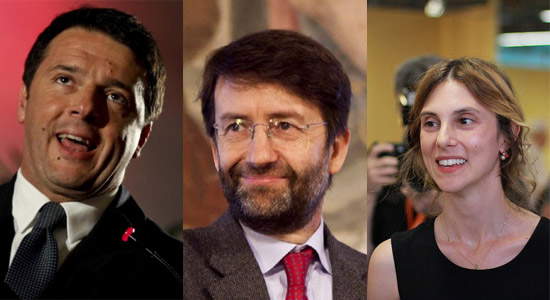Renzi, Franceschini and Madia: scrappers of cultural heritage? Toward the dismantling of the superintendencies
As in 2014, again this year, in the middle of summer, the enemies of cultural heritage are beginning to oil the gears of their machine. In 2014, also in July, evidently taking advantage of the summer atmosphere, the close vacations and the consequent inattention of many, they had given birth to the very bad reform of the MiBACT, about which we have spoken at length on these pages. A reform that kicked off the dismantling of the superintendencies as we had known them until then, through the establishment of regional cultural heritage commissions (Art. 39 of the Prime Minister’s Decree) that officially kicked off the reform), which effectively bypass the superintendencies in many tasks, the establishment of regional museum hubs, and other measures such as the amalgamation and suppression of several superintendencies: for example, Arezzo was merged with Siena and Grosseto, and again the two superintendencies in Calabria, those of Catanzaro, Crotone and Cosenza, and that of Reggio Calabria-Vibo Valentia, were suppressed and a single regional superintendency was created, and practically everywhere the superintendencies for architectural heritage were merged with those for historical and artistic heritage. In short: fewer institutions, with more confusing tasks, but with fewer powers. And let us not forget the last delivery of the reform, namely the useless competition for the appointment of the directors of the twenty autonomous museums.
The MiBACT reform, for all intents and purposes, has paved the way for the last blows that could be dealt to the protection of our cultural heritage and landscape, in defiance of all the proclamations about art and culture uttered by our politicians who, in words, would claim to be champions of art, but in deeds show either the most total disinterest or the most boorish opportunism and, therefore, try to make sure that the work of those who truly protect our heritage proceeds with increasing difficulty. All, now, in the name ofefficiency. Which would seem to be nothing more than an excuse, moreover also decidedly weak and vacillating, to cover other interests: and to understand what those interests might be, it is enough just to think of the Prime Minister’s constant slogans (“The Uffizi are a money machine,” “Superintendent is one of the ugliest words in the vocabulary,” “To enhance culture fewer Bourbon superintendencies, more vitality,” just to name a few).
 |
| Renzi, Franceschini and Madia. The first two images are by VVox.it, the third is by Francesco Pierantoni. All three are distributed under a Creative Commons license. |
Do we really want efficient state apparatuses? Let’s eliminate waste and unproductive and unnecessary spending, and invest in training, turnover and new hires: the superintendencies suffer from a chronic lack of staff, and what is left has a high average age and as a result is often unsuitable to deal with many of the challenges that the future presents to culture (one above all: the relationship between culture and digital). And instead the government, in order to make the apparatuses of the state more efficient, according to it, decides to deprive them of fundamental powers, to reduce their areas of intervention, to subordinate them to other institutions that perhaps would not have the competencies to make decisions in their matters, but are put in a position to do so by virtue of their level in the organizational structure of the state.
In recent days we had talked about the Madia bill, which aims to reform the public administration, and in particular we had talked about Article 3, which introduces silence of consent in relations between state administrations: if a public administrator, required to respond to a request, fails to do so in a predetermined timeframe, the request will automatically be considered accepted. We had already mentioned the danger of this measure, so we refer you to thearticle in which we discussed it.
However, the Madia decree also contains other, equally insidious surprises: there is an article, number 7, which in paragraph 1c provides for the “confluence in the State Territorial Office of all peripheral offices of the civil administrations of the State.” TheState Territ orial Office would be none other than the Prefecture, which will take on that new name after the reform. It follows that since the superintendency is a “peripheral office of the civil administrations of the State,” all superintendencies will be able to merge into the Prefectures, and thus depend on prefects. On the risks of this confluence Tomaso Montanari wrote well a few days ago in Repubblica: the superintendencies are not the offices where “those who break the boxes to those who decide to open a window on the roof” work, but rather are the institutes that “oppose the speculations that continue to drown us in concrete.” The real risk could consist, as Montanari points out, in the subordination of the superintendent to the prefect, with all that could follow in terms of decisions and competencies. The Chamber of Deputies, however, has approved an order of the day that “commits the government to provide that the direct functions of protection, conservation, enhancement and enjoyment of cultural heritage provided by the Code of Cultural Heritage (Legislative Decree No. 42 of January 22, 2004), remain the exclusive and autonomous competence of the administration in charge of the protection of cultural heritage.” How, it is not known: we therefore await developments, but there is certainly cause for concern.
So much so that yesterday an appeal was launched to Dario Franceschini, signed by several prominent personalities of our culture (former minister Massimo Bray, among others, figures), to ask the minister to watch for possible violations of Article 9 of the Constitution. Making the superintendency subordinate to the prefecture could in fact constitute a case for it to be called, precisely, a violation of the article. We, however, have some small perplexities about the success of the appeal: if the attack on the superintendency started from a reform that has been somewhat Franceschini’s workhorse, hopes are in fact diminished. Although they are not entirely lost since Franceschini has nonetheless shown good sense on the issue of silence consent, so we hope he can respond positively to the appeal. The fact remains that the reforms signed by Franceschini and Madia (even though they are in all respects products strongly desired by Renzi) constitute the starting point for the scrapping of our cultural heritage: we can still oppose the final dismantling of the superintendencies and the consequent end of the heritage protection system as we have known it so far, but we must show strong passion in criticizing the government’s action.
Warning: the translation into English of the original Italian article was created using automatic tools. We undertake to review all articles, but we do not guarantee the total absence of inaccuracies in the translation due to the program. You can find the original by clicking on the ITA button. If you find any mistake,please contact us.



























